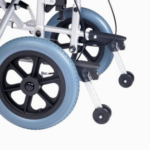Do You Need Wheelchair Anti-Tip Wheels? A Guide for Increased Safety
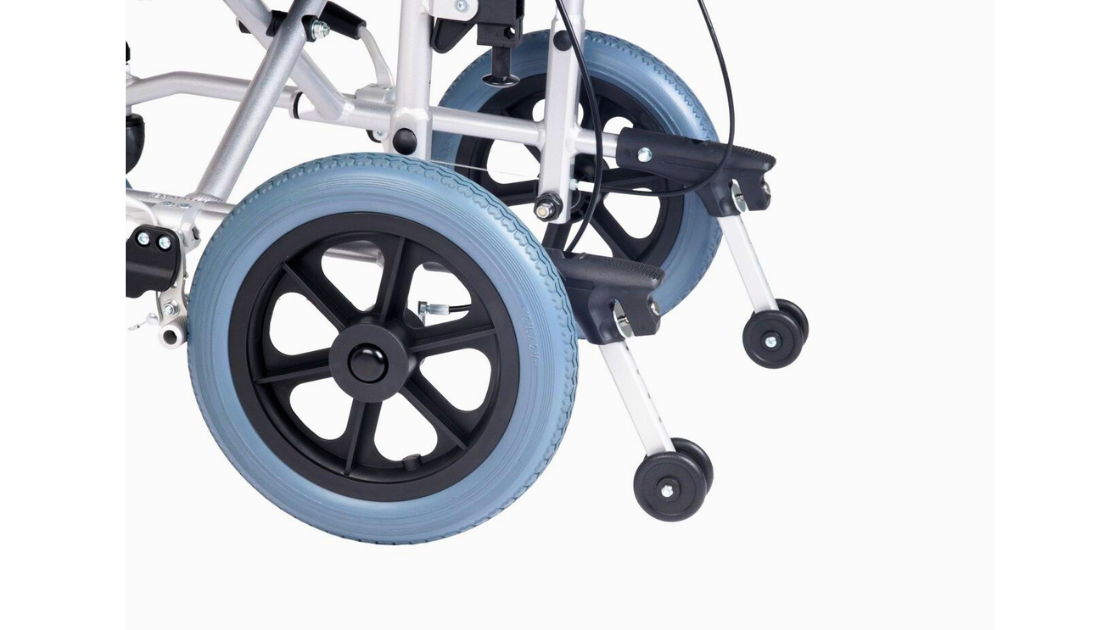
Are you a wheelchair user or caring for someone who is? If so, safety is likely a top priority. Wheelchairs provide freedom and independence, but they also come with risks, particularly the potential for tipping over.
In this guide, we will explore the importance of wheelchair anti-tip wheels in enhancing safety and preventing accidents. Anti-tippers are small yet crucial components that prevent wheelchairs from tipping backwards, providing stability and peace of mind, especially on uneven terrain or steep ramps.
Table of Contents
What are Wheelchair Anti-Tippers?
Wheelchair anti-tippers, also known as anti-tip bars, anti-tip wheels, or safety wheels, are small wheels or bars located at the rear of a wheelchair, just above ground level. They are typically 5 to 8 cm in diameter and are made from durable materials such as rubber or nylon. These wheels prevent the wheelchair from tipping backwards, ensuring the user remains safe and secure.
Why Are Wheelchair Anti-Tippers Important?
Wheelchair anti-tippers are essential for preventing accidents that can occur when a wheelchair tips backwards. This is particularly important for users of self-propelled wheelchairs who may exert too much force, causing instability. Anti-tippers also provide stability when an attendant lifts the front of the chair to navigate curbs or steps.
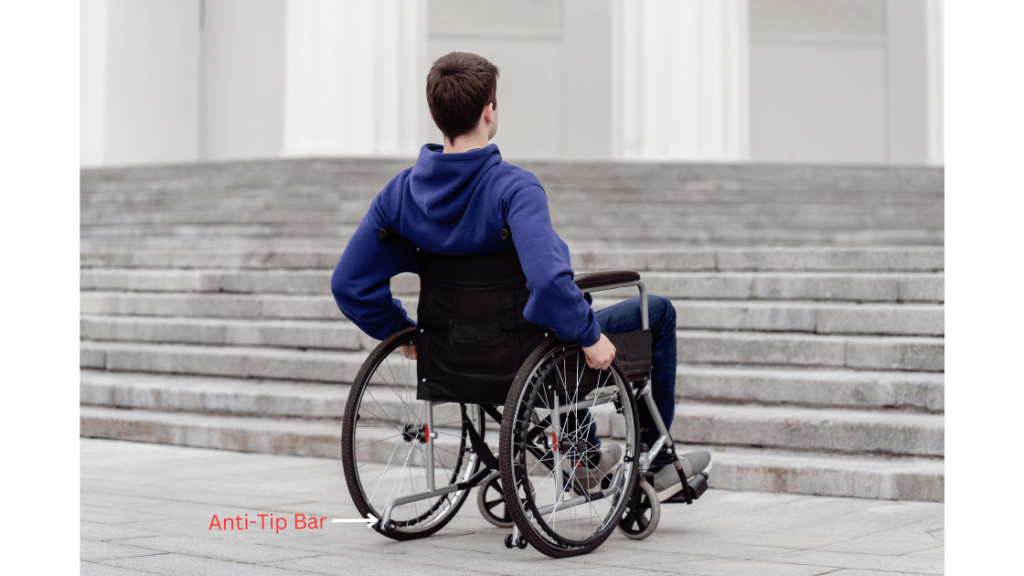
How Do Wheelchair Anti-Tippers Work?
Anti-tippers work by preventing the rear of the wheelchair from rising too high off the ground. When too much force is applied to the front wheels, the anti-tippers make contact with the ground, stopping the wheelchair from tipping over. This feature is particularly useful for ensuring safety when navigating uneven terrain or when making sudden movements.
Types of Wheelchair Anti-Tippers
There are two types of wheelchair anti-tippers available on the market: fixed and removable.
Fixed Anti-Tippers
Fixed anti-tippers are permanently attached to the wheelchair. They provide constant protection but can make the wheelchair longer and potentially more cumbersome to transport.
Removable Anti-Tippers
Removable anti-tippers can be detached when not needed, making them convenient for transport and storage. However, they require regular attachment and detachment, which might be inconvenient for some users.
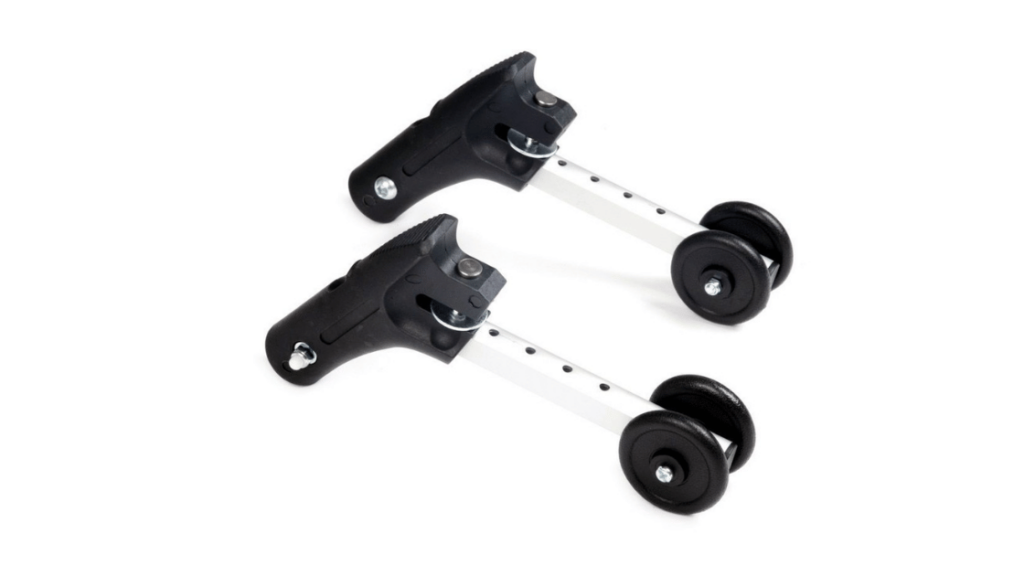
Benefits of Anti-Tippers
- Enhanced Safety: The primary benefit of anti-tippers is the enhanced safety they provide. They prevent the wheelchair from tipping backwards, reducing the risk of injury.
- Increased Stability: Anti-tippers help maintain the wheelchair's stability, especially when navigating uneven surfaces or steep ramps.
- Peace of Mind: Knowing that anti-tippers are in place can give wheelchair users and their caregivers peace of mind, allowing them to focus on other aspects of mobility and care.
Common causes of wheelchair tips and falls
Understanding why wheelchairs tip over and how to prevent it. Knowing why wheelchairs can tip over helps users and caregivers avoid accidents. Here are some common reasons:
- Uneven ground: Cracked sidewalks, gravel paths, or rough roads can make wheelchairs tilt and tip.
- Steep ramps: Going up or down steep ramps without support can lead to tipping.
- Weight imbalance: Carrying heavy items on the backrest or hanging bags on the handles can affect balance and cause tipping.
- Sudden stops or turns: Stopping suddenly or turning sharply, especially at high speeds or on slippery surfaces, can make the wheelchair tip over.
By understanding and addressing these causes, wheelchair users can stay safer and avoid tipping accidents.
Potential Drawbacks of Anti-Tippers
While anti-tippers offer significant benefits, there are some potential drawbacks to consider:
- Hindrance on Curbs: Anti-tippers can sometimes hinder the ability to tip the wheelchair to mount high curbs or steps, as they make contact with the ground and prevent the required angle.
- Increased Length: Fixed anti-tippers can make the wheelchair longer, which might be inconvenient for storage and transportation.
- Added Weight: Although relatively lightweight, anti-tippers add some weight to the wheelchair, which might be a concern for some users.
- Grounding on Rough Terrain: On uneven or rough terrain, anti-tippers can cause the wheelchair to ground out, potentially hindering movement.
Adjusting Wheelchair Balance
Some wheelchairs come with frame adjustments that allow the rear wheels to be moved forward or backward to stabilise the centre of gravity. This feature can make anti-tippers unnecessary for some users, as it allows for better weight distribution and stability. If you are more concern about wheelchairs stability then read the Guidance on the Stability of Wheelchairs report from the department of MHRA & BHTA(British Healthcare Trades Association) guidelines on stability for wheelchair users
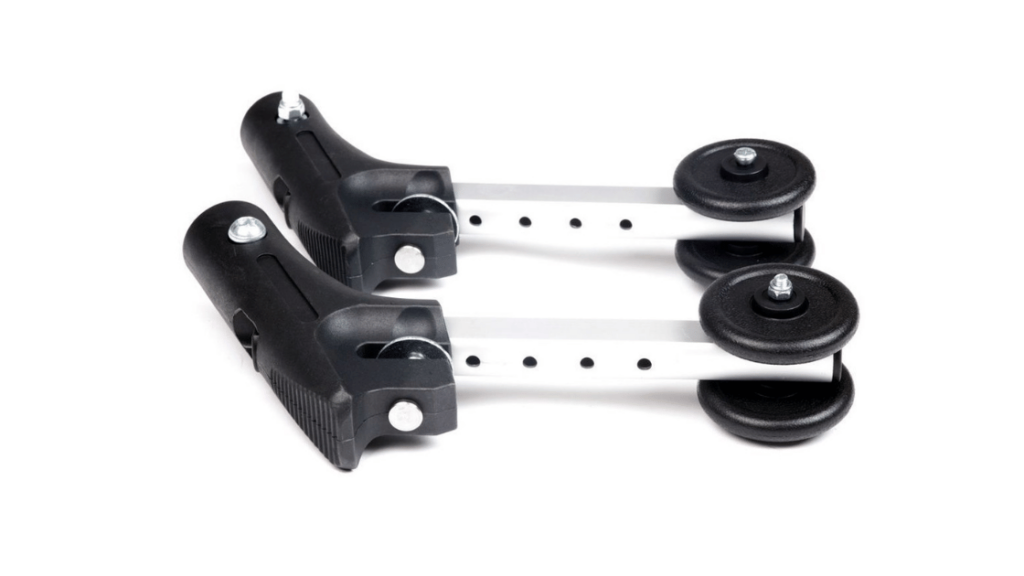
Do You Need Anti-Tippers?
Whether or not you need anti-tippers depends on your specific needs and preferences. For those who feel insecure in their wheelchair due to its tendency to tip backwards, anti-tippers are a valuable feature. Younger users with more upper body strength and better coordination might prefer not to use anti-tippers, as they can hinder manoeuvrability.
For sports wheelchairs, anti-tippers are often essential. These wheelchairs require constant stability due to the aggressive movements and turns involved in sports like basketball or rugby.
Choosing the right anti-tip wheels for your wheelchair
It's important to pick the right anti-tip wheels for your wheelchair to stay safe. Here's what to think about:
- Compatibility: Make sure the anti-tip wheels fit your wheelchair model. Different wheelchairs need different attachment methods, so choose wheels that can be fitted securely.
- Wheel size and material: The wheels should be the right size for your wheelchair and made of tough material that can handle different surfaces.
- Adjustability: Look for wheels that can be adjusted for height or angle. This lets you customise them to suit your needs.
- Brand reputation and reviews: Check out different brands and read reviews to find reliable wheels. Choose a well-known brand with good feedback.
By thinking about these things, you can choose anti-tip wheels that make your wheelchair safer and more reliable.
Installing wheelchair anti-tip wheels
Installing your wheelchair's anti-tip wheels properly is important for safety. Here's how to do it:
- Read the instructions: Read the manual carefully to understand how to install the wheels and what tools you might need.
- Prepare the wheelchair: Make sure the wheelchair is steady and the brakes are on. Remove any extras or loose items.
- Attach the wheels: Follow the manual to attach the wheels to the wheelchair frame securely and align them properly.
- Test for stability: After installing, gently tilt the wheelchair back to see if the anti-tip wheels touch the ground and prevent tipping.
- Make adjustments if needed: If the wheels don't work right, adjust them as instructed. Fix any problems before using the wheelchair.
Following these steps will ensure your anti-tip wheels are installed correctly and work well.
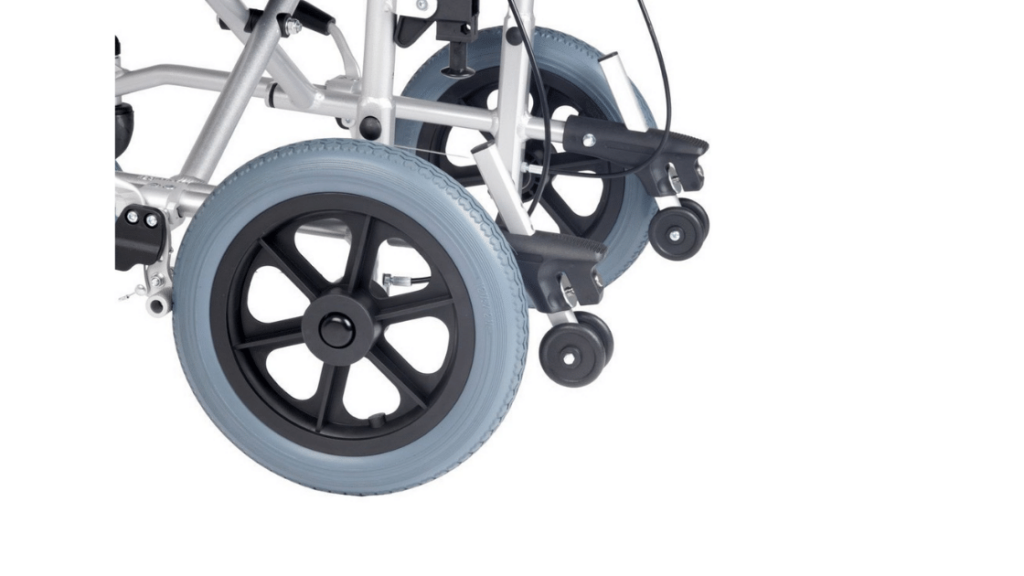
Maintaining and caring for wheelchair anti-tip wheels
Keeping your wheelchair's anti-tip wheels in good condition is important for their longevity and effectiveness. Here's how to take care of them:
- Regular checks: Look over the wheels regularly for damage, wear, or loose parts. If you spot any issues, fix them promptly to keep the wheels stable.
- Cleaning: Clean the wheels often to remove dirt or anything else that might make them slip. Use mild soap and water, avoiding harsh cleaners.
- Tyre check: Keep an eye on the tyres to make sure they have enough grip. If they're worn or damaged, think about replacing them to keep the wheels working well.
- Lubrication: If the wheels have moving parts, lubricate them as directed. This stops them from rusting and helps them move smoothly.
- Professional help: If you notice big problems or the wheels aren't working right, get them checked by a pro. They can fix any issues and keep your wheels safe.
Following these tips will help your anti-tip wheels last longer and keep you safe.
Conclusion
Wheelchair anti-tippers are a vital safety feature for many users. They prevent tipping accidents, provide stability, and offer peace of mind. While they might have some drawbacks, such as hindering curb navigation and adding weight, the benefits often outweigh these concerns.
When choosing anti-tippers, consider whether fixed or removable options best suit your needs. Ensure they are compatible with your wheelchair and provide the necessary stability for your daily activities.
At Mobility Shop, we offer a range of high-quality anti-tippers designed for our U-GO Wheelchairs to enhance your safety and confidence. Explore our selection and find the perfect anti-tipper for your wheelchair today.
By understanding the importance of anti-tippers and how they work, you can make an informed decision to enhance your wheelchair safety and enjoy greater mobility and independence.
Frequently Asked Questions
What is the anti-tip on a wheelchair?
Anti-tips are small wheels or bars attached to the wheelchair to prevent it from tipping backwards. They are crucial for enhancing the safety and stability of the wheelchair, especially on uneven surfaces or slopes
Do I need anti-tippers on a wheelchair?
Whether you need anti-tippers depends on your usage. If you often navigate slopes, uneven terrain, or have concerns about tipping backwards, anti-tippers are highly recommended to ensure safety and stability
How do I stop my wheelchair from tipping over?
To prevent your wheelchair from tipping over:
1. Use anti-tip devices.
2. Distribute weight evenly.
3. Avoid steep slopes and uneven surfaces.
4. Maintain your wheelchair regularly to ensure all parts function properly
What is a wheelchair tip assist?
A wheelchair tip assist is a feature or device that helps caregivers tilt the wheelchair backwards safely to navigate curbs or obstacles without tipping over completely
What is the use of a tipping lever in a wheelchair?
A tipping lever helps caregivers tilt the wheelchair backwards to navigate curbs or steps. It provides a leverage point for safer and easier tipping
Can a wheelchair tip backwards?
Yes, a wheelchair can tip backwards, especially when navigating slopes or if the user leans too far back. Anti-tippers can help prevent this by providing additional stability
Can a wheelchair tip forward?
Yes, a wheelchair can tip forward, particularly if the user leans too far forward or if the front wheels hit an obstacle abruptly. Proper weight distribution and careful navigation can help prevent this
What causes a wheelchair to tip?
Wheelchairs can tip due to:
1. Uneven ground or obstacles.
2. User movement and weight shifts.
3. Inappropriate gradients or slopes.
4. Improper weight distribution and added accessories
What is the use of an anti-tipper in a wheelchair?
Anti-tippers prevent the wheelchair from tipping over, enhancing stability and safety for the user, particularly on uneven terrain or when making sudden movements
How to prevent falls from wheelchairs?
1. Use anti-tip devices.
2. Regularly inspect and maintain the wheelchair.
3. Avoid steep slopes and uneven surfaces.
4. Ensure proper weight distribution and secure all accessories
What is an anti-tipping device on a wheelchair?
An anti-tipping device is an attachment that prevents a wheelchair from tipping over by providing extra stability, typically mounted at the rear of the wheelchair
What is the center of gravity of a wheelchair?
The center of gravity in a wheelchair is the point where the combined weight of the user and the wheelchair balances. It affects the stability and maneuverability of the wheelchair
What are anti-tip wheels on a wheelchair?
Anti-tip wheels are small wheels attached to the rear of the wheelchair to prevent it from tipping backwards. They enhance stability and safety, particularly on slopes and uneven surfaces
What are the benefits of anti-tippers on a wheelchair?
1. Increased safety by preventing tipping.
2. Enhanced stability on slopes and uneven terrain.
3. Peace of mind for users and caregivers
What causes a wheelchair to tip?
Wheelchairs can tip due to uneven ground, improper weight distribution, inappropriate slopes, and user movements. Understanding these causes helps prevent accidents
What is dumping a wheelchair?
"Dumping" a wheelchair refers to adjusting the seating angle so the rear of the seat is lower than the front. This can affect the center of gravity and stability, sometimes used to prevent the user from sliding forward but may increase the risk of tipping backwards
Are anti-tip wheels necessary?
Anti-tip wheels are highly recommended for ensuring wheelchair stability and safety. They prevent the wheelchair from tipping backwards, especially on uneven surfaces or when navigating slopes. While not always necessary, they provide valuable peace of mind and added security for many users

